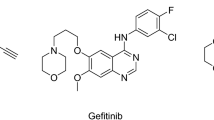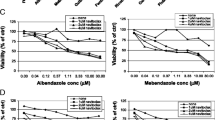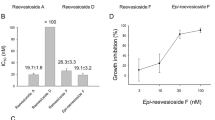Abstract
Gefitinib is the first targeted drug approved for non-small cell lung cancer (NSCLC) treatment. Clinical trails showed that patients with certain clinical and histologic characteristics (such as women, patients of East Asian descent, no history of smoking, and adenocarcinoma) had higher rates of response and overall survival. Despite excellent clinical response to gefinitib in certain NSCLC patients, nearly all patients who respond initially to gefitinib later develop drug resistance. Isothiocyanates have been shown to possess antitumor activity, inhibiting several types of cancer cells growth. However, there are limited studies on their effects on chemoresistance of cancer cells. In this report, we found that benzyl isothiocyanate (BITC) inhibited gefitinib-resistant human NSCLC cells growth by inducing apoptosis in a dose-dependent manner, and activated caspase-3. There were no effects of BITC on epidermal growth factor receptor and multidrug resistant proteins expression. BITC caused cell cycle arrest at G2/M phase, reactive oxygen species generation, and glutathione depletion. Akt activity and NFκB transcriptional activation were suppressed; mitogen-activated protein kinase and activator protein 1 (AP-1) were activated. Our results demonstrated that BITC overcame gefitinib resistance in lung cancer cells. The further understanding of the anti-resistance mechanism of BITC would contribute to establish it as a potent lead compound for the synthesis of novel anticancer drugs.









Similar content being viewed by others
References
Ferlay, J., Shin, H. R., Bray, F., Forman, D., Mathers, C., & Parkin, D. M. (2010). Estimates of worldwide burden of cancer in 2008: GLOBOCAN 2008. Int J Cancer, 127, 2893–2917.
Rudd, R. M., Gower, N. H., Spiro, S. G., Eisen, T. G., Harper, P. G., Littler, J. A., et al. (2005). Gemcitabine plus carboplatin versus mitomycin, ifosfamide, and cisplatin in patients with stage IIIB or IV non-small-cell lung cancer: a phase III randomized study of the London Lung Cancer Group. J Clin Oncol, 23, 142–153.
Martoni, A., Marino, A., Sperandi, F., Giaquinta, S., Di Fabio, F., Melotti, B., et al. (2005). Multicentre randomised phase III study comparing the same dose and schedule of cisplatin plus the same schedule of vinorelbine or gemcitabine in advanced non-small cell lung cancer. Eur J Cancer, 41, 81–92.
Baselga, J., & Arteaga, C. L. (2005). Critical update and emerging trends in epidermal growth factor receptor targeting in cancer. J Clin Oncol, 23, 2445–2459.
Thatcher, N., Chang, A., Parikh, P., Rodrigues Pereira, J., Ciuleanu, T., von Pawel, J., et al. (2005). Gefitinib plus best supportive care in previously treated patients with refractory advanced non-small-cell lung cancer: results from a randomised, placebo-controlled, multicentre study (Iressa Survival Evaluation in Lung Cancer). Lancet, 366, 1527–1537.
Fukuoka, M., Yano, S., Giaccone, G., Tamura, T., Nakagawa, K., Douillard, J. Y., et al. (2003). Multi-institutional randomized phase II trial of gefitinib for previously treated patients with advanced non-small-cell lung cancer (The IDEAL 1 Trial) [corrected]. J Clin Oncol, 21, 2237–2246.
Cataldo, V. D., Gibbons, D. L., Perez-Soler, R., & Quintas-Cardama, A. (2011). Treatment of non-small-cell lung cancer with erlotinib or gefitinib. N Engl J Med, 364, 947–955.
Wheeler, D. L., Dunn, E. F., & Harari, P. M. (2010). Understanding resistance to EGFR inhibitors-impact on future treatment strategies. Nat Rev Clin Oncol, 7, 493–507.
Wu, X., Zhou, Q. H., & Xu, K. (2009). Are isothiocyanates potential anti-cancer drugs? Acta Pharmacol Sinica, 30, 501–512.
Cuddihy, S. L., Brown, K. K., Thomson, S. J., & Hampton, M. B. (2008). Induction of apoptosis by phenethyl isothiocyanate in cells overexpressing Bcl-XL. Cancer Lett, 271, 215–221.
Mi, L., Xiao, Z., Hood, B. L., Dakshanamurthy, S., Wang, X., Govind, S., et al. (2008). Covalent binding to tubulin by isothiocyanates. A mechanism of cell growth arrest and apoptosis. J Biological Chem, 283, 22136–22146.
Boreddy, S. R., Sahu, R. P., & Srivastava, S. K. (2011). Benzyl isothiocyanate suppresses pancreatic tumor angiogenesis and invasion by inhibiting HIF-alpha/VEGF/Rho-GTPases: pivotal role of STAT-3. Plos One, 6, e25799.
Hu, Y., Lu, W., Chen, G., Zhang, H., Jia, Y., Wei, Y., et al. (2010). Overcoming resistance to histone deacetylase inhibitors in human leukemia with the redox modulating compound beta-phenylethyl isothiocyanate. Blood, 116, 2732–2741.
Trachootham, D., Zhang, H., Zhang, W., Feng, L., Du, M., Zhou, Y., et al. (2008). Effective elimination of fludarabine-resistant CLL cells by PEITC through a redox-mediated mechanism. Blood, 112, 1912–1922.
Zhang, H., Trachootham, D., Lu, W., Carew, J., Giles, F. J., Keating, M. J., et al. (2008). Effective killing of Gleevec-resistant CML cells with T315I mutation by a natural compound PEITC through redox-mediated mechanism. Leukemia, 22, 1191–1199.
Yan, H., Zhu, Y., Liu, B., Wu, H., Li, Y., Wu, X., et al. (2011). Mitogen-activated protein kinase mediates the apoptosis of highly metastatic human non-small cell lung cancer cells induced by isothiocyanates. Br J Nutr, 106(12), 1779–1791.
Xu, K., & Thornalley, P. J. (2000). Studies on the mechanism of the inhibition of human leukaemia cell growth by dietary isothiocyanates and their cysteine adducts in vitro. Biochem Pharmacol, 60, 221–231.
Wu, X., Zhu, Y., Yan, H., Liu, B., Li, Y., Zhou, Q., et al. (2010). Isothiocyanates induce oxidative stress and suppress the metastasis potential of human non-small cell lung cancer cells. BMC Cancer, 10, 269.
Xu, K., Guidez, F., Glasow, A., Chung, D., Petrie, K., Stegmaier, K., et al. (2005). Benzodithiophenes potentiate differentiation of acute promyelocytic leukemia cells by lowering the threshold for ligand-mediated corepressor/coactivator exchange with retinoic acid receptor alpha and enhancing changes in all-trans-retinoic acid-regulated gene expression. Cancer Res, 65, 7856–7865.
Wei, W., Fan, Y., Liu, H., Wu, Z., Wan, H., Yan, Z., et al. (2009). Relationship between mutations of the epidermal growth factor receptor gene and drug-resistance to Gefitinib in human lung cancer in vitro. Zhongguo Fei Ai Za Zhi, 12, 28–32.
Di Pasqua, A. J., Hong, C., Wu, M. Y., McCracken, E., Wang, X., Mi, L., et al. (2010). Sensitization of non-small cell lung cancer cells to cisplatin by naturally occurring isothiocyanates. Chem Res Toxicol, 23, 1307–1309.
Xiao, D., & Singh, S. V. (2010). Phenethyl isothiocyanate sensitizes androgen-independent human prostate cancer cells to docetaxel-induced apoptosis in vitro and in vivo. Pharm Res, 27, 722–731.
Sahu, R. P., Zhang, R., Batra, S., Shi, Y., & Srivastava, S. K. (2009). Benzyl isothiocyanate-mediated generation of reactive oxygen species causes cell cycle arrest and induces apoptosis via activation of MAPK in human pancreatic cancer cells. Carcinogenesis, 30, 1744–1753.
Xiao, D., Powolny, A. A., Moura, M. B., Kelley, E. E., Bommareddy, A., Kim, S. H., et al. (2010). Phenethyl isothiocyanate inhibits oxidative phosphorylation to trigger reactive oxygen species-mediated death of human prostate cancer cells. J Biological Chem, 285, 26558–26569.
Mi, L., Gan, N., & Chung, F. L. (2011). Isothiocyanates inhibit proteasome activity and proliferation of multiple myeloma cells. Carcinogenesis, 32, 216–223.
Ait-Mohamed, O., Battisti, V., Joliot, V., Fritsch, L., Pontis, J., Medjkane, S., et al. (2011). Acetonic extract of Buxus sempervirens induces cell cycle arrest, apoptosis and autophagy in breast cancer cells. Plos One, 6, e24537.
Johnson, J. J., Petiwala, S. M., Syed, D. N., Rasmussen, J. T., Adhami, V. M., Siddiqui, I. A., et al. (2012). Alpha-Mangostin, a xanthone from mangosteen fruit, promotes cell cycle arrest in prostate cancer and decreases xenograft tumor growth. Carcinogenesis, 33, 413–419.
Thakur, V. S., Gupta, K., & Gupta, S. (2012). Green tea polyphenols causes cell cycle arrest and apoptosis in prostate cancer cells by suppressing class I histone deacetylases. Carcinogenesis, 33, 377–384.
Wondrak, G. T. (2009). Redox-directed cancer therapeutics: molecular mechanisms and opportunities. Antioxid Redox Signal, 11, 3013–3069.
Trachootham, D., Alexandre, J., & Huang, P. (2009). Targeting cancer cells by ROS-mediated mechanisms: a radical therapeutic approach? Nat Rev Drug Discov, 8, 579–591.
Altomare, D. A., & Testa, J. R. (2005). Perturbations of the AKT signaling pathway in human cancer. Oncogene, 24, 7455–7464.
Chen, K. F., Chen, H. L., Tai, W. T., Feng, W. C., Hsu, C. H., Chen, P. J., et al. (2011). Activation of phosphatidylinositol 3-kinase/Akt signaling pathway mediates acquired resistance to sorafenib in hepatocellular carcinoma cells. J Pharmacol Exp Ther, 337, 155–161.
O’Brien, N. A., Browne, B. C., Chow, L., Wang, Y., Ginther, C., Arboleda, J., et al. (2010). Activated phosphoinositide 3-kinase/AKT signaling confers resistance to trastuzumab but not lapatinib. Mol Cancer Ther, 9, 1489–1502.
Sos, M. L., Koker, M., Weir, B. A., Heynck, S., Rabinovsky, R., Zander, T., et al. (2009). PTEN loss contributes to erlotinib resistance in EGFR-mutant lung cancer by activation of Akt and EGFR. Cancer Res, 69, 3256–3261.
Gu, C., Zhang, Z., Yu, Y., Liu, Y., Zhao, F., Yin, L., et al. (2011). Inhibiting the PI3 K/Akt pathway reversed progestin resistance in endometrial cancer. Cancer Sci, 102, 557–564.
Rebucci, M., Peixoto, P., Dewitte, A., Wattez, N., De Nuncques, M. A., Rezvoy, N., et al. (2011). Mechanisms underlying resistance to cetuximab in the HNSCC cell line: role of AKT inhibition in bypassing this resistance. Int J Oncol, 38, 189–200.
Gupta, M., Ansell, S. M., Novak, A. J., Kumar, S., Kaufmann, S. H., & Witzig, T. E. (2009). Inhibition of histone deacetylase overcomes rapamycin-mediated resistance in diffuse large B-cell lymphoma by inhibiting Akt signaling through mTORC2. Blood, 114, 2926–2935.
Suzuki, M., Abe, A., Imagama, S., Nomura, Y., Tanizaki, R., Minami, Y., et al. (2010). BCR-ABL-independent and RAS/MAPK pathway-dependent form of imatinib resistance in Ph-positive acute lymphoblastic leukemia cell line with activation of EphB4. Eur J Haematol, 84, 229–238.
Guo, X., Ma, N., Wang, J., Song, J., Bu, X., Cheng, Y., et al. (2008). Increased p38-MAPK is responsible for chemotherapy resistance in human gastric cancer cells. BMC Cancer, 8, 375.
Derin, D., Eralp, Y., Ozluk, Y., Yavuz, E., Guney, N., Saip, P., et al. (2008). Lower level of MAPK expression is associated with anthracycline resistance and decreased survival in patients with hormone receptor negative breast cancer. Cancer Investig, 26, 671–679.
Normanno, N., Campiglio, M., Maiello, M. R., De Luca, A., Mancino, M., Gallo, M., et al. (2008). Breast cancer cells with acquired resistance to the EGFR tyrosine kinase inhibitor gefitinib show persistent activation of MAPK signaling. Breast Cancer Res Treat, 112, 25–33.
Normanno, N., De Luca, A., Maiello, M. R., Campiglio, M., Napolitano, M., Mancino, M., et al. (2006). The MEK/MAPK pathway is involved in the resistance of breast cancer cells to the EGFR tyrosine kinase inhibitor gefitinib. J Cell Physiol, 207, 420–427.
Ghayad, S. E., Vendrell, J. A., Larbi, S. B., Dumontet, C., Bieche, I., & Cohen, P. A. (2010). Endocrine resistance associated with activated ErbB system in breast cancer cells is reversed by inhibiting MAPK or PI3 K/Akt signaling pathways. Int J Cancer, 126, 545–562.
Jiao, J. W., & Wen, F. (2011). Tanshinone IIA acts via p38 MAPK to induce apoptosis and the down-regulation of ERCC1 and lung-resistance protein in cisplatin-resistant ovarian cancer cells. Oncol Rep, 25, 781–788.
Paillas, S., Boissiere, F., Bibeau, F., Denouel, A., Mollevi, C., Causse, A., et al. (2010). Targeting the p38 MAPK pathway inhibits irinotecan resistance in colon adenocarcinoma. Cancer Res, 71, 1041–1049.
Oyama, M., Nagashima, T., Suzuki, T., Kozuka-Hata, H., Yumoto, N., Shiraishi, Y., et al. (2011). Integrated quantitative analysis of the phosphoproteome and transcriptome in tamoxifen-resistant breast cancer. J Biological Chem, 286, 818–829.
Bachmeier, B., Fichtner, I., Killian, P. H., Kronski, E., Pfeffer, U., & Efferth, T. (2011). Development of resistance towards artesunate in MDA-MB-231 human breast cancer cells. Plos One, 6, e20550.
Author information
Authors and Affiliations
Corresponding author
Rights and permissions
About this article
Cite this article
Liu, BN., Yan, HQ., Wu, X. et al. Apoptosis Induced by Benzyl Isothiocyanate in Gefitinib-Resistant Lung Cancer Cells is Associated with Akt/MAPK Pathways and Generation of Reactive Oxygen Species. Cell Biochem Biophys 66, 81–92 (2013). https://doi.org/10.1007/s12013-012-9456-9
Published:
Issue Date:
DOI: https://doi.org/10.1007/s12013-012-9456-9




